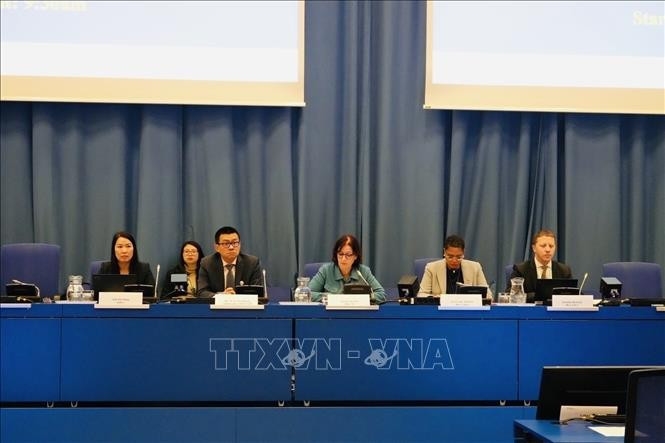The meeting, held at the headquarters of the International Atomic Energy Agency (IAEA) in Vienna, Austria, drew the participation of over 100 representatives from 70 countries around the world.
    |
 |
|
Ambassador Vu Le Thai Hoang (second from left) congratulates Mongolia on becoming the latest country to join the CPPNM Amendment in 2025. |
In his opening speech, Hoang congratulated Mongolia on becoming the latest country to join the CPPNM Amendment in 2025 - a milestone of particular significance as the international community marks the 20th anniversary of the adoption of the Amendment. He emphasized the role of the CPPNM and its Amendment as the only binding international legal instruments for the protection of nuclear material and as a crucial pillar of the global nuclear security system, contributing to the prevention of nuclear terrorism.
He reaffirmed that the Technical Meeting, or the Points of Contact meeting, continues to be an important forum for exchanging information, updating the progress of implementation, strengthening understanding of countries' obligations to designate points of contact, and promoting the expansion of Convention membership.
The ambassador emphasized the importance of sharing experiences to jointly overcome challenges in implementing the Convention and its Amendment, especially in the context of increasingly complex nuclear security threats.
He called on countries to continue promoting the universalization of the Convention, enhancing the effectiveness of Points of Contact, and making greater use of IAEA support tools such as the International Physical Protection Advisory Service (IPPAS), the International Nuclear Security Advisory Service (INSServ), and the Integrated Nuclear Security Support Plan (INSSP).
At the meeting, delegates highly appreciated the results achieved since the Amendment to the CPPNM was adopted. They listened to an update from the IAEA on technical and legal support, and discussed in-depth the practical role of points of contact, as well as experiences in implementing the CPPNM and its Amendment through national presentations by Brazil, Kenya, and Romania.
The discussions focused on strengthening inter-agency coordination, sharing information to combat nuclear material trafficking, improving legal and institutional frameworks, and mobilizing international support in implementing the Convention. Notably, the meeting marked the first participation of the United Nations Office on Drugs and Crime (UNODC) as an observer, highlighting the need for increased coordination among international organizations in combating crimes related to nuclear material.
Vietnam's role in chairing the meeting once again affirms the image of a member state that is active, responsible, and has made practical contributions to the collective efforts of the international community to ensure nuclear security and safety, thereby contributing to peace, stability, and sustainable development.
Source: VNA